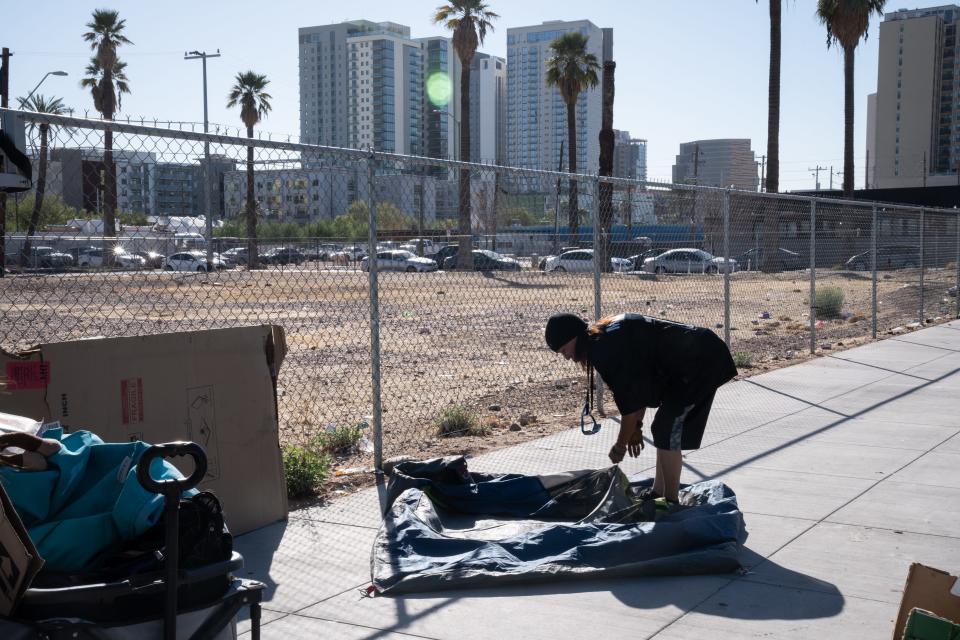Why giving homeless people housing before drug treatment hurts us all
Homelessness is both a humanitarian crisis and a public safety crisis.
Failed policies in progressive cities like Portland and San Francisco have led to the proliferation of homeless encampments as breeding grounds for drug use and criminal activity.
We need to act to avoid going down a similar path.
In September, I chaired a hearing addressing the alarming rise in homelessness, which has increased by nearly 25% in the last few years across the state.
Let us acknowledge the pain endured by individuals living on streets and their families, grappling with addiction, abuse, trauma, neglect and mental illness. But government at all levels has failed them, along with the surrounding neighborhoods and businesses.
While housing stock and evictions play a role, our leaders seem to believe that simply providing housing will solve everything.
This is the premise of Scottsdale’s Housing First strategy, where homeless individuals receive shelter before treatment, even if they struggle with addiction or mental illness.
Where Housing First falls short
While this may seem compassionate, Housing First falls short.
There’s no accountability. Participation in treatment is optional, and sobriety is voluntary. This is not true compassion; it’s enablement that fails to address the root causes of homelessness.
That’s exactly how “The Zone” in Phoenix got started; city leaders failed to enforce a camping ban, thereby allowing mental health and substance abuse problems to go unchecked.
The truth about how Scottsdale: Handles homelessness at a hotel
California exemplifies the shortcomings of Scottsdale’s approach.
Despite the state spending more than $17 billion on housing for homeless individuals since 2020, public encampments have boomed. It’s clear that throwing money at the problem without addressing underlying issues is a flawed and futile strategy.
Arizonans know that a different path is needed. In a July poll, 78% of Arizona voters recognized that homelessness is on the rise, and a majority believe that mental health and substance abuse recovery programs are essential.
Why Treatment First works better

A Treatment First approach, which emphasizes targeted, evidence-based treatment programs that empower individuals to break free from the cycle of homelessness, offers a more promising solution.
Treatment First requires significant performance-based investments that monitor outcomes such as people getting sober, taking appropriate medication, getting a job and finishing their education.
It requires access to appropriate health care, substance abuse treatment, government services and other supports necessary to get people back on their feet.
It requires people to participate in treatment and maintain sobriety.
Regrettably, the Housing First playbook persists in Arizona.
In May, Scottsdale sought funding to continue a program renting out hotel rooms for a year, alongside paying guests, blurring the lines between shelter and accommodation.
Area residents rightly expressed displeasure, and I sought clarity about this program from the city.
The city’s responses were short and dismissive. Concerns lingered, especially regarding participant vetting and outcome tracking.
Scottsdale should learn from mistakes
I also questioned the legality of using state funds for this program, particularly for foreign nationals, a federal responsibility.
A few weeks later, the state Department of Housing and the city of Scottsdale reversed course, promising that people living in The Zone and foreign nationals would not be served by the Scottsdale program.
However, just days later, a councilmember stated in a KJZZ interview that the city might still serve those populations later.
We need leaders like Mayor David Ortega to learn from other states’ mistakes, ensuring transparency in spending tax dollars and measuring program outcomes.
While he may tout a 70% success rate, he neglects to mention that the city stops tracking these individuals the day they leave the hotel.
Glossing over key details makes for a terrible program that costs taxpayers more money without honest results to show for it.
We have a moral obligation to confront homelessness directly, and a Treatment First model is the best way forward.
Rep. Matt Gress, a Republican, represents Legislative District 4 in Phoenix. He chairs the House Appropriations Subcommittee on Budgetary Funding Formulas and is vice chair of the Joint Legislative Audit Committee. On X, formerly Twitter: @MatthewGress.
This article originally appeared on Arizona Republic: Homeless people need treatment before shelter, or they will fail

